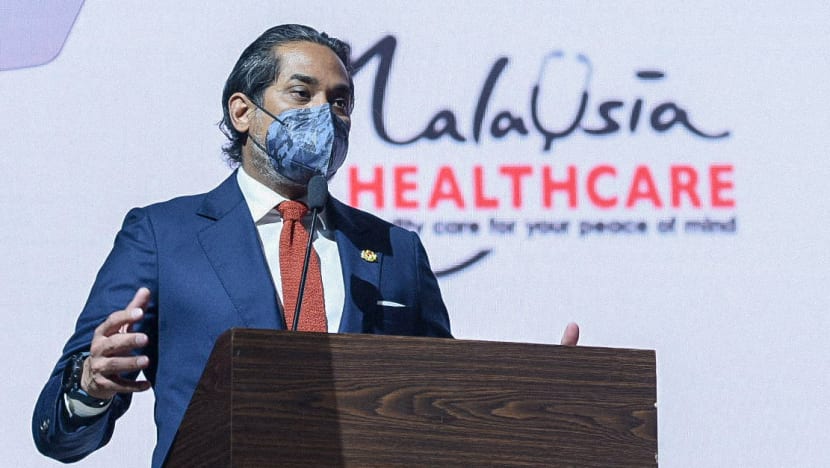Malaysia hopes to become Asia’s treatment hub for hepatitis C; offering treatment at fraction of cost: Health minister

Malaysia's Health Minister Khairy Jamaluddin delivers a keynote address at the insigHT2021 conference to launch Malaysia as a destination for Hepatitis C treatment. (Photo:MITC)
KUALA LUMPUR: Malaysia is aspiring to become the hepatitis C treatment hub for Asia, with promises of treatment at a fraction of current costs.
Health Minister Khairy Jamaluddin said that Malaysia is poised to offer affordable and efficacious treatments for those infected with the virus.
This is made possible as Malaysia is the first country in the world to be given conditional approval for the use of Ravidasvir in combination with Sofosbuvir to treat hepatitis C.
“I hope Malaysia, launched today as a destination for Hep C treatment will offer those suffering from this disease access to more effective, accessible, and crucially more affordable solutions,” Mr Khairy said in a keynote address at a medical travel conference on Tuesday (Nov 16).
A 12-week cost of treatment for hepatitis which in Malaysia could come up to RM356,000 (US$84,000), a factor that prohibits many from seeking treatment.
Health Ministry director-general Dr Noor Hisham Abdullah had said previously that it is possible to get a 12-week treatment using Ravidasvir and a generic version of Sofosbuvir at a cost of US$100 by getting it produced locally.
The hepatitis C virus, which is transmitted through blood, can cause liver cirrhosis, scarring and cancer if untreated.
A silent killer, it could take 20 to 30 years before symptoms appear.
According to the World Health Organisation (WHO), an estimated 58 million people have chronic hepatitis C virus infection, with about 1.5 million new infections occurring every year.
Those at risk were intravenous drug users who shared needles, blood transfusion or organ transplant recipients and those undergoing dialysis.
Other risk groups include those who handle contaminated needles, share personal items such as razors, or do body piercing or tattooing.
The development of Ravidasvir was initiated by Malaysia’s Ministry of Health and the Geneva-based Drugs for Neglected Diseases initiative (DNDi).
The clinical studies were funded by Malaysian and Thailand health authorities, as well as other agencies, companies and organisations.
Initial findings published in The Lancet Gastroenterology & Hepatology in April this year, revealed a very high efficacy of Ravidasvir-Sofosbuvir combination in the treatment of hepatitis C.
The findings showed a 97 per cent efficacy in curing 301 patients with chronic hepatitis C infection in Malaysia and Thailand between Sep 14, 2016 and Jun 5, 2017.
The treatment involving Ravidasvir will be available in January 2022.
MALAYSIA AS DESTINATION FOR HEALTHCARE TOURISM: KHAIRY
Mr Khairy said that medical tourism was an important sector to the country, achieving close to RM1.7 billion in revenue from hospital receipts in 2019.
Because of the travel restrictions caused by the COVID-19 pandemic, Mr Khairy said they were targeting RM520 million in hospital receipts this year and RM800 million next year.
Mr Khairy added that revenue from medical tourism is only expected to reach pre-pandemic level in 2025.
“We want to establish Malaysia once again as a leading travel destination providing clear direction to our value proposition as a destination for healthcare tourism,” he said.
He said that as hepatitis C treatment would take more than three months, there would be a multiplier effect to the economy.
Mr Khairy also said that while they were not rushing the opening of the country’s borders, he hoped that the opening of Vaccinated Travel Lanes (VTL) such as with Singapore on Nov 29 would help medical tourism.
Malaysian Healthcare Travel Council (MHTC), a government agency responsible for curating Malaysia’s healthcare travel scene, said that they would be coming up with packages for hepatitis C treatments.
MHTC chief executive officer Daud Mohd Arif said that the packages would include treatment and a vacation in the country.
They hope to be able to kick off the initiative by the second quarter of next year.















